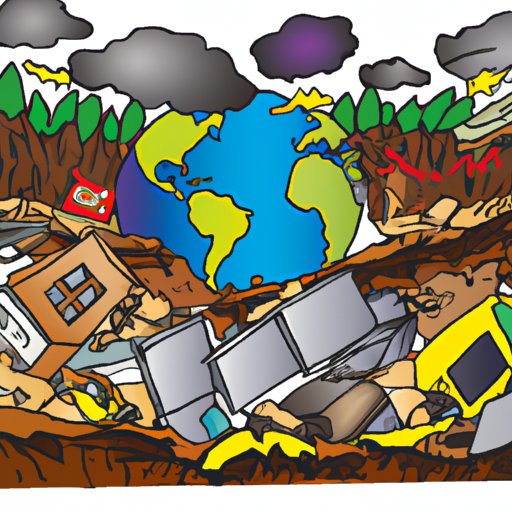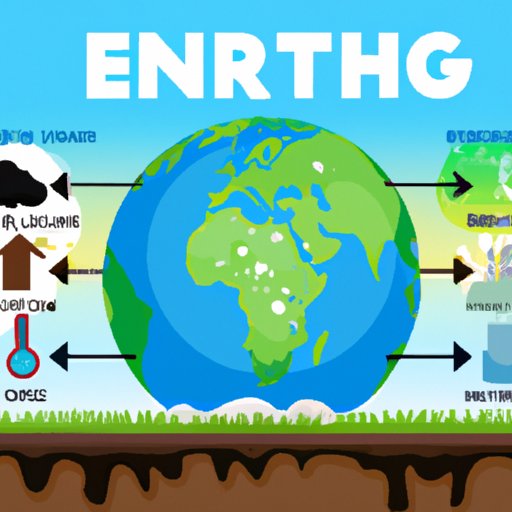Introduction
Earth science is a broad field that encompasses many different scientific disciplines. It involves the study of the Earth, its materials, its atmosphere, its oceans and its life forms, as well as the interactions between these elements. Earth science helps us to better understand our planet and how it is changing over time. In this article, we will explore why earth science is important by looking at topics such as climate change, understanding Earth’s resources, responding to natural disasters, creating more efficient energy sources and monitoring environmental changes.

Climate Change and Earth Science
The impacts of climate change are becoming increasingly evident, from rising sea levels to extreme weather events. Earth science is essential for helping us to understand the causes and effects of climate change, as well as for developing strategies for mitigating its impacts. For example, according to a 2019 report from the Intergovernmental Panel on Climate Change (IPCC), “Earth system science provides insights into the complex interactions between the atmosphere, land, ocean, ice sheets and other components of the climate system, which are essential for understanding and predicting climate variability and change.”
The implications of climate change are far-reaching, with potential impacts on food security, water availability, human health and biodiversity. By using earth science to better understand the drivers of climate change, we can develop strategies for reducing emissions and adapting to a changing climate. This could involve improving agricultural practices to reduce emissions, investing in renewable energy sources or protecting ecosystems that are vulnerable to climate change.
Understanding Earth’s Resources
Earth science is also important for helping us to understand our planet’s resources and how we can use them sustainably. Natural resources such as water, minerals, forests and soil are vital for human survival and economic prosperity. Understanding these resources and their availability is essential for managing them effectively. For example, earth science can help us to understand the impacts of human activity on water resources, as well as to identify strategies for sustainable management of water resources.
Earth science can also be used to identify new sources of mineral resources and to assess the environmental impacts of mining operations. By understanding the distribution of resources and the environmental consequences of their extraction, we can ensure that resources are managed in a way that is both economically viable and environmentally responsible.

Natural Disasters and Earth Science
Earth science can also help us to prepare for and respond to natural disasters such as floods, earthquakes and landslides. By studying the underlying geological processes that lead to natural disasters, we can develop strategies for minimizing their impacts. For example, earth science can help us to identify areas that are prone to flooding and to design flood defenses that are effective in reducing the risk of flooding.
Earth science can also be used to monitor natural disasters in real time. By tracking seismic activity, for example, scientists can provide early warnings of earthquakes and tsunamis. This can give people time to evacuate to safety or take other measures to minimize the impacts of a disaster.
Energy Sources and Earth Science
Earth science is an important tool for finding ways to create more efficient energy sources. By studying the Earth’s subsurface, scientists can identify locations for extracting geothermal energy, for example, or for building offshore wind farms. In addition, earth science can help us to understand the impacts of energy production on the environment. For example, a 2020 study published in Nature Communications found that “geological knowledge can enable us to identify suitable sites and minimize environmental impacts associated with energy production.”
By using earth science to identify more efficient and sustainable energy sources, we can reduce our reliance on fossil fuels and help to mitigate the impacts of climate change.

Environmental Changes and Earth Science
Earth science is also important for predicting and monitoring environmental changes. By studying the Earth’s climate, atmosphere and oceans, scientists can identify changes that are occurring on a global scale. This can help us to anticipate the impacts of climate change and to develop strategies for adapting to a changing environment. For example, earth science can help us to predict changes in sea level, air temperature and precipitation patterns, as well as to identify areas that are most vulnerable to environmental change.
In addition, earth science can help us to monitor changes in land use and vegetation cover. This can be used to identify areas that are being degraded due to deforestation or unsustainable farming practices, for example. By understanding the impacts of human activities on the environment, we can develop strategies for restoring damaged ecosystems and promoting sustainable development.
Conclusion
In summary, earth science is an essential tool for understanding and responding to the challenges facing our planet. From climate change to energy sources, natural disasters to environmental changes, earth science provides us with invaluable insights into the workings of our planet. By using earth science, we can develop strategies for mitigating the impacts of climate change, managing resources sustainably, preparing for natural disasters, creating more efficient energy sources and protecting our environment.
(Note: Is this article not meeting your expectations? Do you have knowledge or insights to share? Unlock new opportunities and expand your reach by joining our authors team. Click Registration to join us and share your expertise with our readers.)
